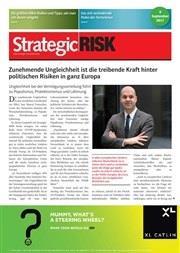Wealth inequality is resulting in populism, protectionism and paralysis

Rising inequality in Western societies is resulting in populism, protectionism and paralysis, according to Marcel Fratzscher, president of the German Institute for Economic Research.
Speaking to StrategicRISK ahead of his talk at the GVNW Symposium this morning, Fratzscher explains the rising inequality is driving political developments in many Western countries, including the election of Donald Trump as the US president, the British vote to leave the European Union, and the very strong performance of right-wing populist parties across Europe.
“In Germany, 40% of households have no net wealth whatsoever. Wealth inequality is a big source of the high level of dissatisfaction in society. It is the key reason behind the polarisation, whether you look at the standard of living, at the rise of poverty, or at people’s political behaviour, what parties they are voting for.”
The economic consequences of rising inequality are what Fratzscher calls the three Ps: populism, protectionism and paralysis.
“Populism often also has a very strong anti-European dimension. In every European country, including Germany, when things go well it is a national responsibility, but when things go wrong it’s Europe’s fault, it’s the euro, it’s Brussels, it’s European regulation and so on. This bashing of Europe is harmful. It’s also bad for many companies and the financial sector, as it creates substantial uncertainty in terms of policy.”
Fratzscher also points out the rise in protectionism. US president Trump has threatened to impose protectionist laws, but protectionism is also visible in the behaviour of many emerging markets. China and many other emerging markets are implementing capital controls and are trying to manipulate or control the exchange rate.
“Protectionist elements can also be observed in countries in Europe, where for many the question is ‘how can we protect national interests?’ That clearly has direct consequences, not just related to trade barriers and trade protectionism, but also protectionism related to FDI, to cross-border investment and to taxation.”
The third P stands for paralysis. “One of the results of that polarisation is the lack of fundamental economic reform. This includes reform at a European level to make the euro sustainable and reform European institutions.”
Additional political risks across Europe stem directly or indirectly from these three risks, including the Greek debt crisis, Brexit, and the sovereign debt and banking crisis, which Fratzscher believes is a big threat for Italy in particular.
Brexit: a mixed bag
While the UK has much more to lose from its exit out of the EU, Fratzscher says Brexit will also impact on other European countries. “Trade is the most obvious one. Germany is a very open economy that trades a lot with the UK. But I’m not too worried about trade as I think there will be a substantial transition period and most likely some form of a free-trade agreement.”
He believes the main cost of Brexit will be the loss of a voice to complete the single market. “Britain played an important role in deepening the single market in Europe, both the capital market union as well as a single market for services. Europe overall will become less attractive for global investors and there will be less bilateral trade,” Fratzscher explains.
“Brexit will hurt the UK a lot because companies will resettle or move to continental Europe. There are high expectations that in the financial sector Paris, Frankfurt, maybe Milan or other financial capitals might benefit. In the high-tech area Germany hopes to benefit from R&D intensive companies locating to Germany. Clearly there will be costs, which may come from Europe becoming less competitive and less attractive for global investment, but there is also some variation within Europe, which ultimately means Britain will lose a lot, while for the other European countries it will be more mixed.”




















No comments yet